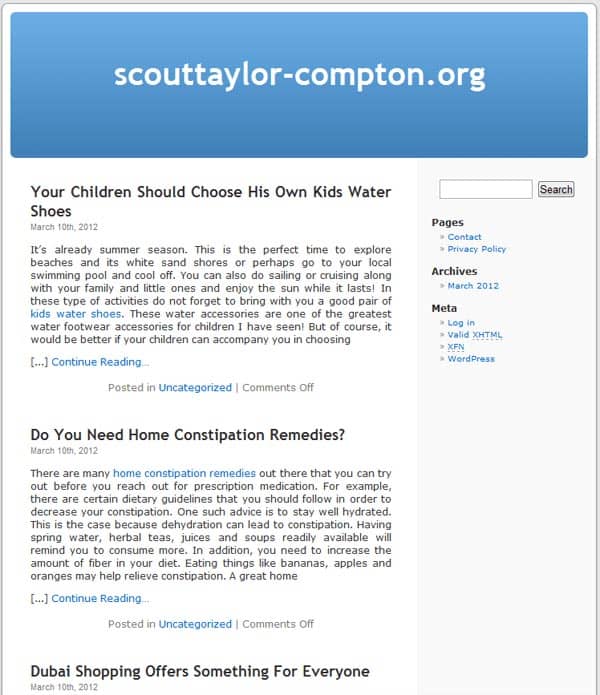Not all SEO agencies truly have your best interests at heart. Here’s how to avoid being a victim.
SEO, or Search Engine Optimization. Just the mere utterance of these words can make even the most tech-savvy person a little uncomfortable.
Even the most brilliant minds tend to shy away from Google Algorithm chatter. Unfortunately, for most business owners these days, it’s a topic that cannot be avoided.
I get it.
You’re too busy running your business to worry about Penguins, Pandas, Hummingbirds, or shifts in the SERPs (whatever the hell that means, amirite?).
But, to be a serious business owner in the digital age, you have to at least have a basic understanding of how all of this digital marketing stuff works.
The internet is everywhere these days. People carry it around in their pockets, for goodness sake.
The search engine marketing industry is expected to hit $19.3 billion this year, according to the Search Engine Marketing Professional Organization (SEMPO).
In its State of Search Marketing Report (conducted by Econsultancy), SEMPO found that 86 percent of search professionals invest in SEO, making it the top search marketing tactic.
The truth is, most business owners prefer to outsource their digital marketing efforts, and for good reason. They don’t have a damn clue how to do any of that stuff, so it’s better to have it handled by experts.
The problem is, we have come to a place where technology is shifting faster than our society’s ability to educate people properly in certain areas.
One of toughest areas is in the field of SEO. Since so much of SEO is based on a single company’s proprietary technology (Google), the ability to effectively train people to properly educate new students is greatly diminished. There is no college degree in SEO. There likely never will be.
But SEO, if done properly, can add millions of dollars to a company’s bottom line. It’s relatively affordable when you consider that a small local business can make a huge profit if they can rank for a handful of local keywords.
And for, in a lot of cases, a little more than $1k a month (which is less than what McDonald's pays it’s new employees) they can make anywhere from 500-1000% ROI from that budget.
This makes outsourcing your SEO efforts an attractive option for many local businesses.
The problem that arises from these unique circumstances is that, since there is no clear standard on what a “good SEO provider” is, and no degree or official certification that is required to provide SEO, virtually anyone can claim to be an “SEO expert”.
This opens the entire marketplace to scammers and fly-by-night companies that are only out to make a quick buck and take advantage of unknowing small business owners.
And to add insult to injury, since the SEO process can take many months to start seeing results, these scammers can many times profit tens of thousands of dollars before their victims even know it’s happening.

If you’re a small business owner and currently outsource your SEO, you could be the victim of a scammer and not even realize it.
Lucky for you, I’m here today with (what I hope) is going to be a simple checklist that you can use to see if your SEO company is actually doing the work they claim to be doing.
Any good SEO company is going to offer a few basic things to clients as part of the process. You can use these things to see if they are doing their job or not.
1. A strategy
All businesses have unique goals and all websites have specific needs when it comes to marketing. Because of this, every SEO campaign needs a solid strategy in order to achieve success.
Most SEO companies will come up with a unique strategy for your business and will share that with you before getting started working on your website.
If your SEO company hasn’t shared any strategy with you, now would be a great time to ask them about it. If they can’t offer you this, you’re probably working with the wrong company.
2. Monthly reporting.
Every SEO company should offer monthly reports that detail things such as website, social & marketing analytics, current (and progressive) rankings for keywords, and a detailed list of all the work that was done that month to help boost your website’s visibility in search engines.
If your SEO company isn’t offering these basic reports, run away.
3. Detailed lists of all profiles, websites, blogs and outreach efforts used in order to try to build links and social media signals to your website. And login details for everything.
This ensures that any work you have paid for, and anything that was created as a result of that work, belongs solely to you.
This is important as disgruntled SEOs have been known to remove all links to a client’s website when they quit, which could seriously impact your rankings.
With these two things alone, you will not only be able to estimate just how much work is actually being done to promote your website, but you’ll be able to make changes yourself later or pass it on to another SEO later down the road to use.
Now comes the scary part.
We’re actually going to dive into these two things and see if you’re actually getting what you’re paying for or if you should consider dropping your SEO provider altogether.
Let’s start with the reports.
Skip past all of the analytics reporting and go straight to the meat.
Yes, those numbers and charts are important, but we want to find out what they actually did.
What links did they build?
What websites did they build them on?
Would these links pass a manual review by someone at Google?
These questions require a little deeper understanding of Google’s guidelines and a little due diligence. Actually click on the links and take a look at the websites that the links are on.
Here are a few examples of the types of backlinks that you want to avoid:
Blog Comment Spam
These are some of the easiest types of links to get, and many SEOs use automated tools that spam hundreds of websites that allow comments.
Not all blog comment links are bad, however, and some can really help with rankings if they are left on highly relevant blog posts.
The problem is, since these links are so easy to come by, they have become a favorite link type for spammers.
Blog comment spam is such a nuisance, Google has created help pages to teach webmasters how to deal with it. For that reason, it would be wise to use them sparingly, even if you’re following best practices.
The good news is, if your SEO is creating mass blog comments by way of comment spam, a quick look at your links will make them easy to spot.
Look for links that have keywords in the anchor text as in the chart below.
This is a sure sign of spam, as this area is meant for the commenter to leave their name, not a keyword.
Also look for comments that are irrelevant to the post (some are complete gibberish and completely unreadable).

When spammers use automated tools like this, it’s relatively easy to spot. Since they’re not actually “reading” the posts that they are leaving their comments on, they can’t make it relevant to the post.
Most times they’ll leave comments such as “Great post! Thanks for sharing!”, or in some cases just complete gibberish that doesn’t even make sense.
If you see links like this being built to your website by your SEO company, it’s time to walk away.
This is 100% spam, and Google will drop the hammer on your rankings if they find these types of links pointing to your website.
Remember that whenever a website is linking to your site, it becomes a connection in Google’s eyes.
Is this website (and the link itself) a good fit for your business?
With Google, relevance is everything. If you’re getting links from irrelevant websites or pages, they’re basically worthless.
Even worse, enough of them can actually harm your site in the long-run.
If you’re seeing a lot of spammy looking backlinks, links from irrelevant websites, or blog comments such as in the image above, it’s a sure sign that your SEO agency is using black-hat methods to promote your website.
While these types of tricks may give results temporarily, in the long-run they can do irreversible damage to your website’s rankings.
PBN Links
A PBN site is a website or blog that exists for the sole purpose of linking to other websites in order to make them rank higher on Google.
PBN stands for “Private Blog Network”, and is basically a website that the SEO company owns and uses to link out to client websites.
These sites can also be owned by other entities, and the SEO company simply pays them a small fee to place links onto their website.
These websites are generally built on expired domain names. If there are enough good links going to an expired domain, it can be a valuable asset to an SEO to purchase and build a website for it, using the link power that the domain still has to pass off to clients.
This method DOES work, and can be extremely effective for increasing the rankings of whatever website it’s linking to, but it goes against Google’s guidelines, and can lead to penalties or de-indexation if Google gets wise to the fact that you are using these types of links.
Google penalties are something that can really hurt your business, so if your SEO company is using tactics like this on your website, it’s probably a good idea to try another provider.
Obviously, it can be rather difficult to tell whether or not a website that is linking to you is a PBN site, but here are a few things that I personally look for when trying to make that determination:
Is the site poorly designed with no logo or brand identity?
While there are many poorly designed websites out there, most of them have a logo or some form of about us page with information about the company or person running the site.
While the lack of these things doesn’t necessarily make it a PBN, if it fails this test and any of the others below, it most likely is.

Are there lots of unrelated posts with no apparent theme for the site?
Most blogs revolve around a central theme. The blog you are reading now is about digital marketing / SEO related topics.
There are lots of blogs out there centered around dating, weight loss, knitting, etc. You get the idea.
If there is no theme, no logo and no identity, it’s probably not a real website.
Does the content on the site seem spammy?
With most PBN sites, the blog posts will generally be poorly written and will contain links (usually using keyword anchor text) out to other sites.
SEOs who operate PBN sites generally have quite a few of them, so publishing content for all of those sites can be both expensive and time consuming.
For this reason, they will rely on software or cheap 3rd world outsourcers to generate the content for them. And as you can imagine, the quality suffers.
There are plenty of other examples that I could list that would help you to determine whether or not your SEO company is incorporating spammy techniques that could hurt your rankings in the long run, but these are a couple of the most common ones used today.
Bottom line, you should never just take their word for it.
Always check the work that was done, and keep your eyes open for anything that looks suspicious.
If you’re not sure, it may be worth it to bring in an expert for a single session to check their work.
It will cost a bit of money, but it’s nothing compared to the money you could lose by continuing to pay for bad SEO.

Another red flag to watch out for would be any sudden drops in traffic or rankings. This could be due to a manual or algorithmic penalty, and it could be a sign that your SEO company isn’t following best practices.
If this happens, take action.
Question them about it, and ask to see a list of all of the work that was done prior to this event. If they are unwilling or unable to provide this, it may be time to hire someone else.
SEO is very important for small businesses, and hiring the wrong company can be devastating if things go wrong. As with anything else, always be aware of what is being done to promote your website, and pay attention to the little details.
Never be afraid to ask questions, even if you don’t think you understand the answers. And if you’re unsure, never hesitate to get a second opinion.
